For Immediate Release: November 17th, 2022
Contact:
Nicholas Williams, Director of Penn Leads the Vote
pennleadsthevote@sas.upenn.edu | vote.upenn.edu
Penn Recognized as an ALL IN Most Engaged Campus for College Student Voting
On the heels of an election that saw impressive turnout among Penn students, the campus was recognized for “making intentional efforts to increase nonpartisan democratic engagement and college student voting”
On November 16, the University of Pennsylvania was recognized as a Most Engaged Campus for College Student Voting by the ALL IN Campus Democracy Challenge. The distinction is awarded to campuses who participate in the ALL IN Campus Democracy Challenge, shared student turnout data from the National Study of Learning, Voting, and Engagement (NSLVE) for the 2020 election, submitted a campus democratic engagement action plan in 2022, and have a signatory to ALL IN’s Higher Education Presidents’ Commitment to Full Student Voter Participation.
Penn is one of only 394 campuses across the United States to receive the distinction. It comes the same year that Penn was recognized by ALL IN as one of only 70 campuses nationally that had a Highly Established Action Plan. Penn is also one of only 184 campuses, and the only Ivy League university, to participate in the Ask Every Student initiative which recognizes collaboration with nonprofit partners.
The award also comes just after Penn students showed up in high numbers to vote in the election on November 8, 2022. Thousands of Penn students voted in on-campus polling places, and many more voted by mail, in off-campus precincts, and in their home state. For all Americans aged 18-29, the average turnout for the 2022 midterms was 27% according to the Center for Information & Research on Civic Learning and Engagement (CIRCLE) at Tufts University.
Penn Leads the Vote (PLTV) has been an integral part of engaging students and institutionalizing voting at Penn. On National Voter Registration Day this year, Penn sent out a University-wide message encouraging Penn community members to register to vote and check their voter registration status. President Liz Magill has also attended three PLTV events this semester, including events held during New Student Orientation, National Voter Registration Day, and Election Day.
Meanwhile, PLTV has worked to reach students through many different avenues. In-person voter registration and education events were held in the fall 2022 semester in college houses, the Pottruck Health and Fitness Center, dining halls, athletic events, and the University’s flu clinic. PLTV also engaged with students and community members digitally, including through social media and email messages. PLTV’s website, vote.upenn.edu, had roughly 12,000 users from August 1, 2022 to Election Day, November 8.
Penn Leads The Vote (PLTV) was established in 2004 and operated by Fox Leadership until 2014. PLTV was re-established in 2018 in the Netter Center for Community Partnerships. PLTV works in collaboration with the Office of Government and Community Affairs, which also oversees Penn’s institutional compliance with voter engagement requirements and on-campus polling location engagement. PLTV also receives funding from Fox Leadership.
For Immediate Release: November 10th, 2022
Contact:
Nicholas Williams, Director of Penn Leads the Vote
pennleadsthevote@sas.upenn.edu | vote.upenn.edu
2022 SEES STRONG TURNOUT AMONG PENN STUDENTS, YOUTH VOTERS
Thousands of Penn students turned out at on-campus polling locations, while young people nationwide had their second highest turnout in a midterm election since 1994
When Election Day came on November 8, Penn students made sure to turn out to vote. 2,239 Penn students voted in on-campus polling locations located in Houston Hall, the ARCH building, and Civic House. This number does not represent the total number of Penn students who voted, since there are some mail-in and provisional ballots that have not been counted yet. In addition, students registered to vote in off-campus housing voted in off-campus precincts, while many students opted to vote in their home state.
Meanwhile, the Center for Information & Research on Civic Learning and Engagement (CIRCLE) at Tufts University has released early projections on youth voter turnout for the 2022 midterm election. Based on the votes that have been counted as of November 10, CIRCLE estimates that 27% of Americans between the ages of 18 and 29 voted in the 2022 midterms. This turnout estimate represents the second-highest turnout rate among young people in a midterm election since 1994, trailing only behind 2018.
In 2018, turnout among students at the University of Pennsylvania was 54.7%, which was well above the nationwide youth turnout of roughly 28%. The data on Penn students’ turnout was compiled as part of the National Study of Learning, Voting, and Engagement, or NSLVE, by the Institute for Democracy & Higher Education (IDHE) at Tufts University’s Tisch College of Civic Life. In addition to having projections on turnout for the 2022 midterms, Tufts also has extensive data on youth turnout in the 2020 presidential election, the 2018 midterm election, and the 2016 presidential election.
The strong turnout from Penn students comes amid the first nationwide election held since the University transitioned back to in-person classes in fall 2021. The 2020 presidential election saw far fewer students vote in person on Penn’s campus since most students were not allowed to live in on-campus housing in fall 2020. Both during remote learning and since students returned to campus, Penn Leads the Vote (PLTV) has supported student voting by registering students to vote, educating them, and supporting mail-in voting and efforts to turn out students on Election Day. For the November 2022 election, PLTV hosted a table outside of Houston Hall to make sure students knew their polling location and were ready to vote.
Penn Leads The Vote (PLTV) was established in 2004 and operated by Fox Leadership until 2014. PLTV was re-established in 2018 in the Netter Center for Community Partnerships. PLTV works in collaboration with the Office of Government and Community Affairs, which also oversees Penn’s institutional compliance with voter engagement requirements and on-campus polling location engagement. PLTV also receives funding from Fox Leadership.
For Release: NOVEMBER 9TH, 2021 at 3PM EST
Contact:
Harrison Feinman and Eva Gonzalez, Co-Directors of Penn Leads the Vote
pennvotes@upenn.edu | vote.upenn.edu
UNIVERSITY OF PENNSYLVANIA VOTED AT RECORD-HIGH RATE IN 2020, SURPASSING THE NATIONAL COLLEGE AND GENERAL POPULATION AVERAGE, ALSO WINS AWARD FOR CAMPUS ACTION PLAN
76.7% of eligible University of Pennsylvania students voted in the 2020 presidential general election, a 9.2% increase from the 2016 election and a 23.1% increase from the 2018 midterm election. Penn students outperformed both the national college student voter turnout rate and general population turnout rate, which were 66% and 67% respectively.
Students at the University of Pennsylvania achieved record-high voter turnout and voter registration rates in the 2020 presidential election. This accomplishment came even as students navigated the first-ever fully-online semester and other disruptions to the voting process due to the COVID-19 pandemic.
Even more impressively, almost 89% of students who registered to vote turned out on Election Day, compared to 73% in 2016 and 64% in 2018. Additionally, a record 86.5% students registered to vote in 2020, up slightly from both 2016 and 2018.
While both graduate and undergraduate students achieved record-high turnout, the undergraduate population continues to vote more often. 69% of eligible undergraduates voted, compared to 56% of eligible graduate students. Similarly, first year students voted at a slightly higher rate (71%) compared to the rest of the undergraduate population (68%).
A majority of students still opted to vote in-person on Election Day, but disruptions in campus and voting operations due to the pandemic resulted in a 52% increase in the number of student voters who voted by mail.
This data comes from the 2020 Campus National Study of Learning, Voting, and Engagement (NSLVE) Report issued by the Institute for Democracy and Higher Education at Tufts University. This report provides both counts and rates on students who vote on-campus and off-campus, those who vote by mail, and those who vote in person.
This data coincides with today’s announcement where the University of Pennsylvania won the ALL IN Democracy Challenge’s 2021 Best Action Plan Award for the Pennsylvania Campus Voting Challenge – 4-year Institution. The Action Plan, written by Penn Leads the Vote, the Netter Center for Community Partnerships, and Office of Government and Community Affairs, outlined the step University took to help students vote and be civically engaged in 2020 and 2021.
These two achievements demonstrate a passionate dedication by University of Pennsylvania students to achieving President Gutmann’s goal of full voter participation by 2028. Continued support from all corners of the campus community will ensure Benjamin Franklin’s mission for Penn to empower its students to be informed and engaged citizens continues to be realized.
The full 2020 NSLVE report for the University of Pennsylvania can be found at vote.upenn.edu/data (after the 9th). The award-winning Action Plan can be found at vote.upenn.edu/briefs.
Penn Leads the Vote (PLTV) is a student-run, non-partisan program that increases voter engagement and voting while advancing Penn’s role of supporting the democratic and civic engagement of Penn students. PLTV is housed in the Netter Center for Community Partnerships and works in collaboration with the Office of Government and Community Affairs.
Penn Leads the Vote is proud to have registered about 111 community members on National Voter Registration Day (9/28/21) and engage over 500 attendees. Special thanks to SEAMAAC for hosting a table and HipCityVeg for providing food.
All photos credits of Eric Sucar, University Communications
.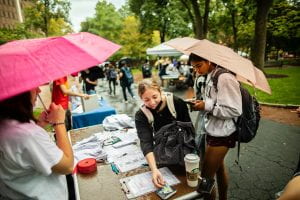
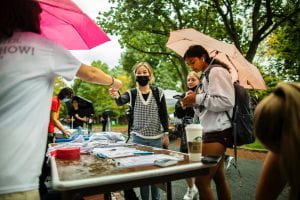
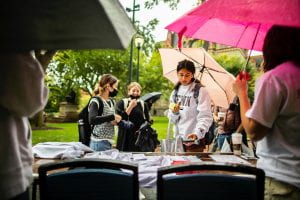
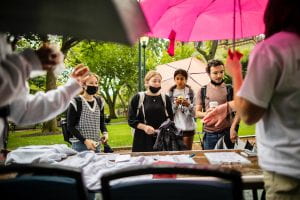
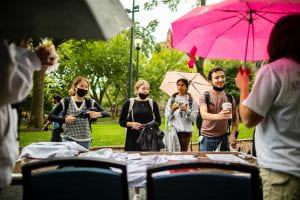
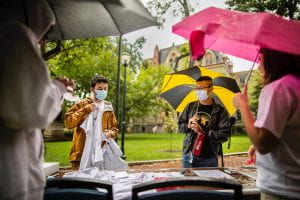
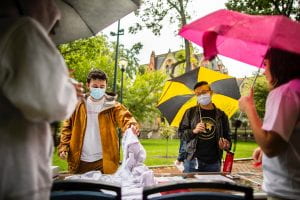
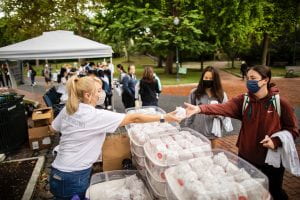
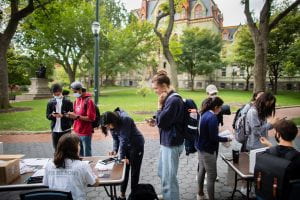
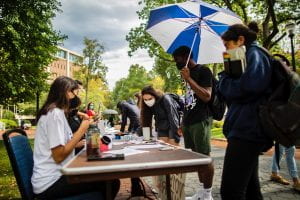
For Immediate Release: September 14th, 2020
Contact:
Harrison Feinman and Eva Gonzalez, Directors of Penn Leads the Vote
pennleadsthevote@sas.upenn.edu | pennvotes.org
Gutmann signed the Higher Education Presidents’ Commitment to Full Student Voter Participation for the ALL IN Campus Democracy Challenge to increase voter turnout at Penn
Philadelphia, PA — On Friday, September 11th, University of Pennsylvania President Amy Gutmann signed the Higher Education Presidents’ Commitment to Full Student Voter Participation for the ALL IN Campus Democracy Challenge. In doing so, Gutmann acknowledged that institutions of higher education have a responsibility to prepare students to be informed and active citizens; that students’ voices are important in all elections; and that there is a need for both curricular and cocurricular experiences to shape students into lifelong voters.
Gutmann’s signature also serves as an endorsement of Ivy League Votes, an initiative which is committed to achieving 100% voter turnout among the Ivy League Schools. All eight members of the Ivy League participate in the program, which is part of the ALL IN Campus Democracy Challenge.
Gutmann is now the 7th Ivy League president to sign the Higher Education Presidents’ Commitment to Full Student Voter Participation. Currently, 237 college and university presidents nationwide have signed this commitment to 100% student voter participation.
The ALL IN Campus Democracy Challenge is dedicated to increasing voter turnout and democratic engagement on college campuses. It is a part of the non-profit organization Civic Nation. The program’s official mission is to “change campus culture and institutionalize democratic engagement activities and programs on college campuses.”
Penn has taken major steps in their preparation for the 2020 election. In 2019, Penn was named a “voter friendly campus” by NAPSA-Student Affairs Administrators in Higher Education and Fair Election Center’s Campus Vote Project (CVP), making it the only Ivy League school to earn the designation. In addition, Penn Leads the Vote’s 2020 Action Plan was given the rating of “established” by the ALL IN Campus Democracy Challenge and the Voter Friendly Campus Program, the highest rating that was awarded
Gutmann’s signature comes less than two months before the day of the 2020 election, November 3rd. In the 2016 presidential election, 50.1% of Penn students voted, according to the National Study of Learning, Voting, and Engagement, (NSLVE), conducted by the Institute for Democracy & Higher Education (IDHE) at Tufts University’s Tisch College of Civic Life. Despite the many difficulties that this fall poses for Penn voters who will be spread out across the country and with an election that will be conducted in large part by mail, Penn Leads the Vote remains committed to increasing student voter turnout for the 2020 election. President Gutmann’s signature demonstrates that the University of Pennsylvania remains a dedicated partner in these efforts.
Penn Leads The Vote (PLTV) was established in 2004 and operated by Fox Leadership until 2014. PLTV was re-established in 2018 in the Netter Center for Community Partnerships. PLTV works in collaboration with the Office of Government and Community Affairs, which also oversees Penn’s institutional compliance with voter engagement requirements and on-campus polling location engagement. PLTV receives funding from the Netter Center, OGCA, and Fox Leadership. PLTV also receives funding and advising from the Sachs Program for Arts Innovation for furthering our message through design.
For Immediate Release: March 9th, 2021
Contact: Nicholas Williams, Communications Coordinator for Penn Leads the Vote
nichwill@sas.upenn.edu | pennvotes@upenn.edu | pennvotes.org
Penn Retains “Voter Friendly Campus” Designation for Second Time
Penn received the designation of “Voter Friendly Campus” from the Campus Vote Project and NASPA for the second time in a row.
Philadelphia, PA — Today, the University of Pennsylvania is one of over two hundred campuses in thirty-seven states and the District of Columbia designated as a “Voter Friendly Campus,” by national nonpartisan organizations Fair Elections Center’s Campus Vote Project (CVP) and NASPA – Student Affairs Administrators in Higher Education. This designation celebrates Penn’s commitment to actively supporting and encouraging voter engagement.
The mission of the Voter Friendly Campus designation is to bolster efforts that help students overcome barriers to participating in the political process. Our campus was evaluated on a campus plan to register, educate, and turnout students in the 2020 election. It also included details on how we implemented these voter engagement efforts on our campus, and a final analysis of our efforts — all in the face of the upheaval caused by the COVID-19 pandemic. The designation is valid through December 2022.
The designation marks the second time that Penn has been named a Voter Friendly Campus. In 2019, Penn became the first member of the Ivy League to be officially designated as a Voter Friendly Campus. With this designation, Penn has demonstrated a strong commitment to the civic mission of higher education by preparing students to be engaged participants in our democracy through 2022 and beyond.
As part of our effort to help Penn be designated a Voter Friendly Campus, Penn Leads the Vote (PLTV) built a virtual infrastructure in the fall of 2020 to increase voting and civic engagement amid the COVID-19 pandemic. Key elements of our engagement infrastructure included the online platform Motivote, social media, and building a team of dedicated volunteers to further help the engagement process.
The designation comes just as the National Study of Learning, Voting, and Engagement, or NSLVE, by the Institute for Democracy & Higher Education (IDHE) at Tufts University’s Tisch College of Civic Life updated their estimates for voter turnout among Penn students in the 2018 midterm elections. NSLVE now estimates that turnout among Penn students was 54.7% in the 2018 midterms, a significant increase from their previous estimate of 41%. This new data moves Penn from Gold- to Platinum-Level recognition from the ALL IN Campus Democracy Challenge — one of only 62 campuses nationwide, and the only Ivy League institution, to receive the award.
The institutions designated Voter Friendly Campuses represent a wide range of two-year, four-year, public, private, rural, and urban campuses. Notably, the list of designated institutions includes many Minority Serving Institutions and Historically Black Colleges and Universities. The program is ultimately serving millions of students.
###
Penn Leads The Vote (PLTV) was established in 2004 and operated by Fox Leadership until 2014. PLTV was re-established in 2018 in the Netter Center for Community Partnerships. PLTV works in collaboration with the Office of Government and Community Affairs, which also oversees Penn’s institutional compliance with voter engagement requirements and on-campus polling location engagement. PLTV receives funding from Fox Leadership. PLTV receives funding and advising from the Sachs Program for Arts Innovation for furthering our message through design.
NASPA is the leading association for the advancement, health, and sustainability of the student affairs profession. Our work provides high-quality professional development, advocacy, and research for 15,000 members in all 50 states, 25 countries, and 8 U.S. territories.
Fair Elections Center is a national, nonpartisan voting rights and legal support organization that works to eliminate barriers to voting and improve election administration across the United States. Fair Elections Center’s Campus Vote Project works with universities, community colleges, faculty, students and election officials to reduce barriers to student voting and helps campuses institutionalize reforms that empower students with the information they need to register and vote.
